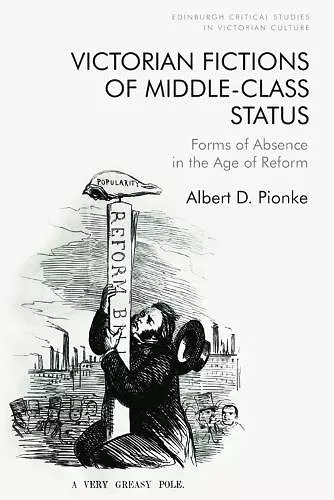Victorian Fictions of Middle-Class Status
Forms of Absence in the Age of Reform
Format:Hardback
Publisher:Edinburgh University Press
Published:29th Nov '22
Should be back in stock very soon

Victorian Fictions of Middle-Class Status recovers the novelistic pervasiveness of a Reform-Era rhetorical form, the negative assertion of value, which grounds middle-class claims to social authority in repudiations of such conventional warrants as birth, wealth, numerical preponderance, command of fact and, specifically for women, the symbolic phallus. Bringing together historical, literary and sociological theory, this study recaptures the Victorians’ broad sense of epistemological uncertainty about their rapidly changing society, reconstructs novelists’ specific attempts to legitimate their traditionally low-status genre and offers fresh readings of novels by Charlotte Brontë, Wilkie Collins, Charles Dickens, George Eliot, Elizabeth Gaskell, William North, Anthony Trollope, William Makepeace Thackeray and Charlotte Yonge, among others.
Victorian Fictions of Middle-Class Status covers a remarkable diversity of themes and texts, and the organization around genre is reader- and classroom-friendly. The book’s central premise—that the Victorian difficulty defining the middle class was essentially a problem of form—is illuminating and well-supported with a nuanced theorization of social class; across multiple genres, Pionke demonstrates that thinking about class status as established via negation rather than affirmation opens interpretive possibilities for the mid nineteenth-century novel. [...] Victorian Fictions of Middle-Class Status offers readers a refreshing and persuasive take on a well-trod subject within the field, broadening critical understanding of the Victorian middle class and the Victorian novel. -- Lana L. Dalley, California State University * Victorian Studies *
Pionke’s approach to examining the connective tissue between life and literature ultimately sets this work apart from previous investigations... The study ultimately deserves praise for offering a new set of categorisations that shaped the Victorian middle-class as represented in, and influenced by, nineteenth-century fiction: more work employing this multidisciplinary route will be welcome and insightful. -- Hendrikje Kaube * Romance, Revolution & Reform *
Essential reading for Victorianists, this book gives a powerful and illuminating account of the novel’s role in defining the middle class. Set against birth and wealth, force and fact, desire and authority – the middle class, Pionke shows us, was knowable only by way of its others -- Caroline Levine, Cornell University
Pionke’s striking innovation is to propose that mid-Victorian bourgeoisie strove to justify their status in negative terms. His persuasive and thought-provoking work allows readers to connect current-day notions of class and economic privilege to an earlier period of capitalist plutocracy – a period in which questions of privilege and invidious economic comparisons found their expression in very different cultural forms." -- John Plotz, Brandeis University
ISBN: 9781399507707
Dimensions: unknown
Weight: unknown
248 pages